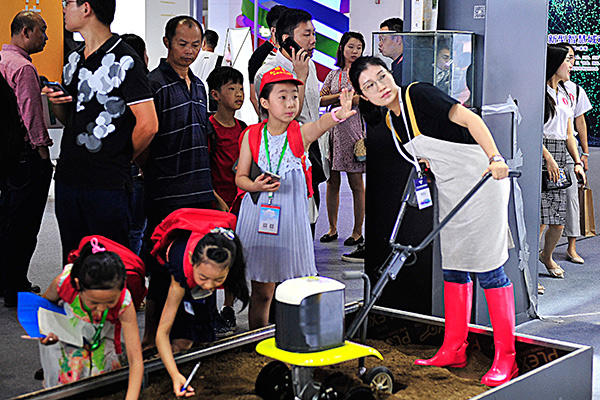
Children learn about agricultural technology at the 2018 World Internet of Things Expo in Wuxi, Jiangsu province. The four-day expo opened on Sept 15.[Photo/China Daily]
China is beefing up efforts to boost the development of the industrial internet, which serves as a key growth engine for its digital economy, according to the country’s top industrial development regulator.
More efforts are needed to make breakthroughs in key technologies — such as chips and smart sensors — participate in international standard-setting activities, apply new industrial internet technologies and products to key industries, and accelerate development of the internet of vehicles and the internet of things, according to Miao Wei, minister of industry and information technology.
The industrial internet, a new type of manufacturing automation that combines advanced machines, internet-connected sensors and big data analysis, is expected to boost productivity and reduce costs in industrial production.
“We will make a big push to develop the industrial internet in three aspects,” Miao said. “First, we will promote the construction of a high-speed broadband network, including 5G connections. Second, we need to build internet application platforms for large firms and public service platforms for small and medium-sized companies. Third, we must attach great importance to the safety of industrial data.”
Miao made the remarks on Sept 15 at the 2018 World Internet of Things Expo in Wuxi, Jiangsu province. The expo opened on Sept 15 and continues through Sept 18.
“Embracing the industrial internet will bring new opportunities for economic and social development, as it helps give impetus to industrial transformation and upgrading, and promote energy saving and emission reduction as well as streamlined management,” Miao said.
Liu Yunjie, a member of the Chinese Academy of Engineering, cited a McKinsey Global Institute report, saying new approaches to boosting productivity could generate $5.6 trillion in additional Chinese GDP by 2030.
“The industrial internet will help enhance labor production and reduce costs,” Liu said. “We need to seize the new opportunity, driving forward companies’ automated and intelligent transformation and connecting industrial and manufacturing sectors in their entirety.”
Sun Pishu, chairman of the Chinese server maker Inspur Group, agreed, saying the industrial internet was key to the integration of the internet, cloud computing, big data, AI and the real economy.
Inspur Group said on Sept 16 that it had set up more than 10 million processors in the country’s granaries, which will provide real-time information such as the temperature and humidity. Through the industrial internet system, it now takes three days to gather the latest statistics of granaries nationwide, compared to 15 days previously.
